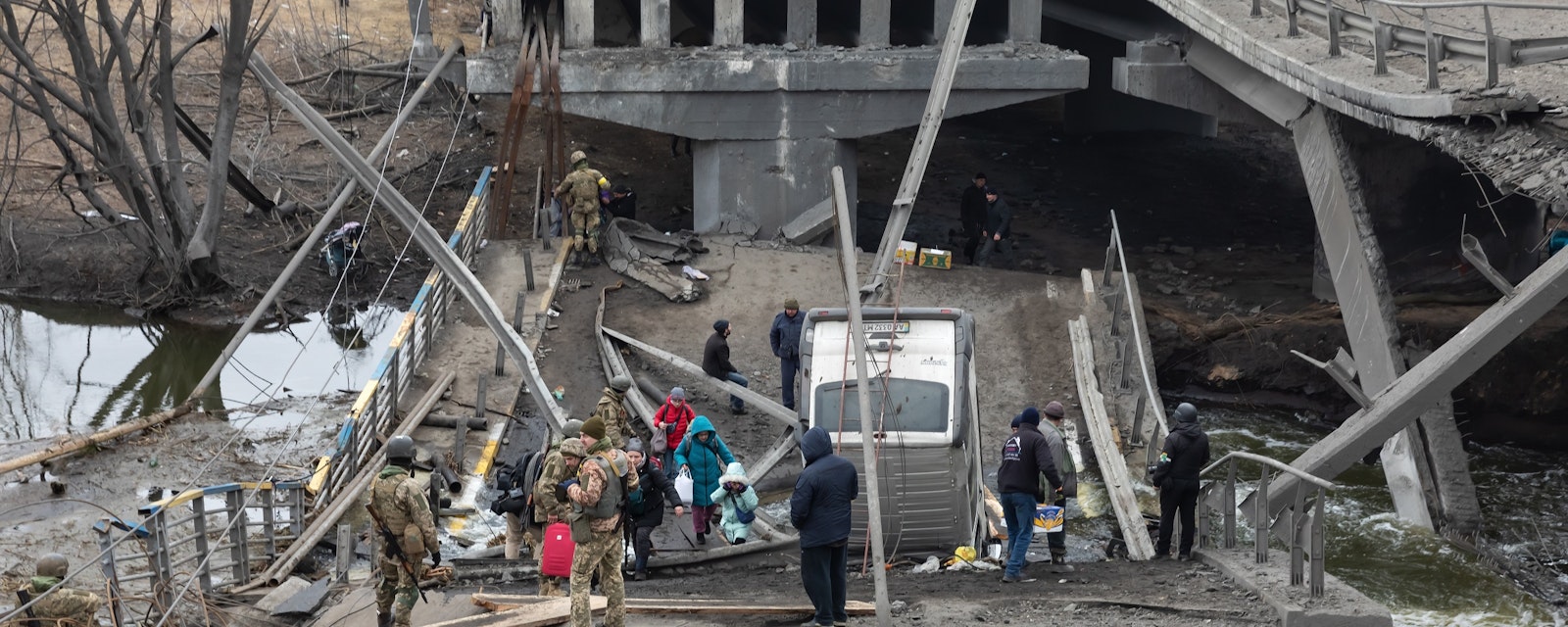Andrea Kendall-Taylor, Senior Advisor at WestExec Advisors and former Deputy National Intelligence Officer for Russia and Eurasia at the National Intelligence Council; Carsten Nickel, Teneo Managing Director and expert on Europe; Orson Porter, Teneo Senior Managing Director and government affairs expert; and Andrius Tursa, Teneo’s Central & Eastern Europe Advisor join our host Kevin Kajiwara for the latest on the Russia-Ukraine war and the ramifications for financial markets, geopolitics and the business world.
Stalemate on the Ground
After encountering greater than expected resistance, Russia is withdrawing their forces from Kyiv. This shouldn’t be seen as a sign that Russia has abandoned its objectives, but rather as a sign that they are reevaluating their strategy. They will most likely focus more on capturing the Donbas region, which provides them with multiple options. If Russia can capture Donbas, they could position this one objective as their main goal and declare victory. They could also use the victory as a way to rally their troops and keep pushing into the rest of Ukraine. The second scenario seems more likely based on Putin’s continued efforts to rally the Russian people to support the war.
War of Attrition
The war is quickly becoming a war of attrition, and analysts are divided as to which side this favors. Russia has more soldiers, weapons and ammunition to throw at the conflict. Putin’s success at mobilizing domestic support for the war is also important because it will make the Russian people more willing to tolerate the mounting casualties. This public support could backfire, however, as the more extreme the nationalist rhetoric regarding the war gets, the more difficult it will be for Putin to exit the conflict with anything less than a total victory.
The Ukrainian side is also unlikely to surrender or give any big concessions in negotiations. Their morale is high, and they are not going to run out of weapons as long as the West continues to supply them. Ukrainian forces have also been able to inflict mass casualties on the Russian forces and have even been able to kill several Russian generals, which is both good for Ukrainian morale as well as being disruptive to Russian units. The Ukrainians have also done a good job hiding how many casualties their side has taken, so it is unclear how many casualties the Ukrainians have suffered.
Faulty Intelligence
The intelligence community correctly predicted that Putin was going to invade Ukraine and was not bluffing. However, they also overestimated the effectiveness of the Russian military and underestimated Ukraine’s willingness to fight back. Putin also had false intelligence that made him think it would be a quick war, leaving him ill-prepared. It is unclear if the ineffectiveness of the Russian military was due to a lack of capability, or if it was caused by poor planning and execution.
Negotiations
There are some divisions within the Kremlin because of Russian failures to capture any key cities. Some advisors want to declare a symbolic victory and end the war quickly, while others want to take a more hard line approach. Putin, as the sole decision maker, doesn’t appear ready to negotiate. Zelensky is also unwilling to make any great concessions t. Ultimately though, Ukraine has a much greater incentive to negotiate as it is the best method for stopping attacks on their cities.
Sanctions
While there has been an unprecedented level of sanctions, they haven’t caused any change of behavior from Russia. Russian oil hasn’t been sanctioned, and Russia still makes over a billion dollars a day from oil sales. Germany is already preparing for gas rationing, and all of Europe will soon start to build their gas reserves for next winter. So far, the West has been united in its will to sanction Russia, but we may start seeing sanction-fatigue as time goes on. However, we are also likely to see more and more brutal images of violence coming out of Ukraine, which may motivate citizens to keep supporting sanctions.
U.S. Politics
Thirty-six governors are up for reelection across the U.S., and rising gas prices are a big issue in all these races. Midterm elections are also approaching, and while the war is fading out of headlines, gas prices have become the prime kitchen table issue. In Washington, D.C., the war has caused the government to earnestly seek out new trading partners, such as Singapore. Biden is also discussing how to use the Defense Production Act to find ways to mine more precious minerals domestically. Both of these discussions may not have happened without the war. The war has also caused a rise in grain and food oil prices, which is a major issue in the gubernatorial race in states like Wisconsin and Pennsylvania.




